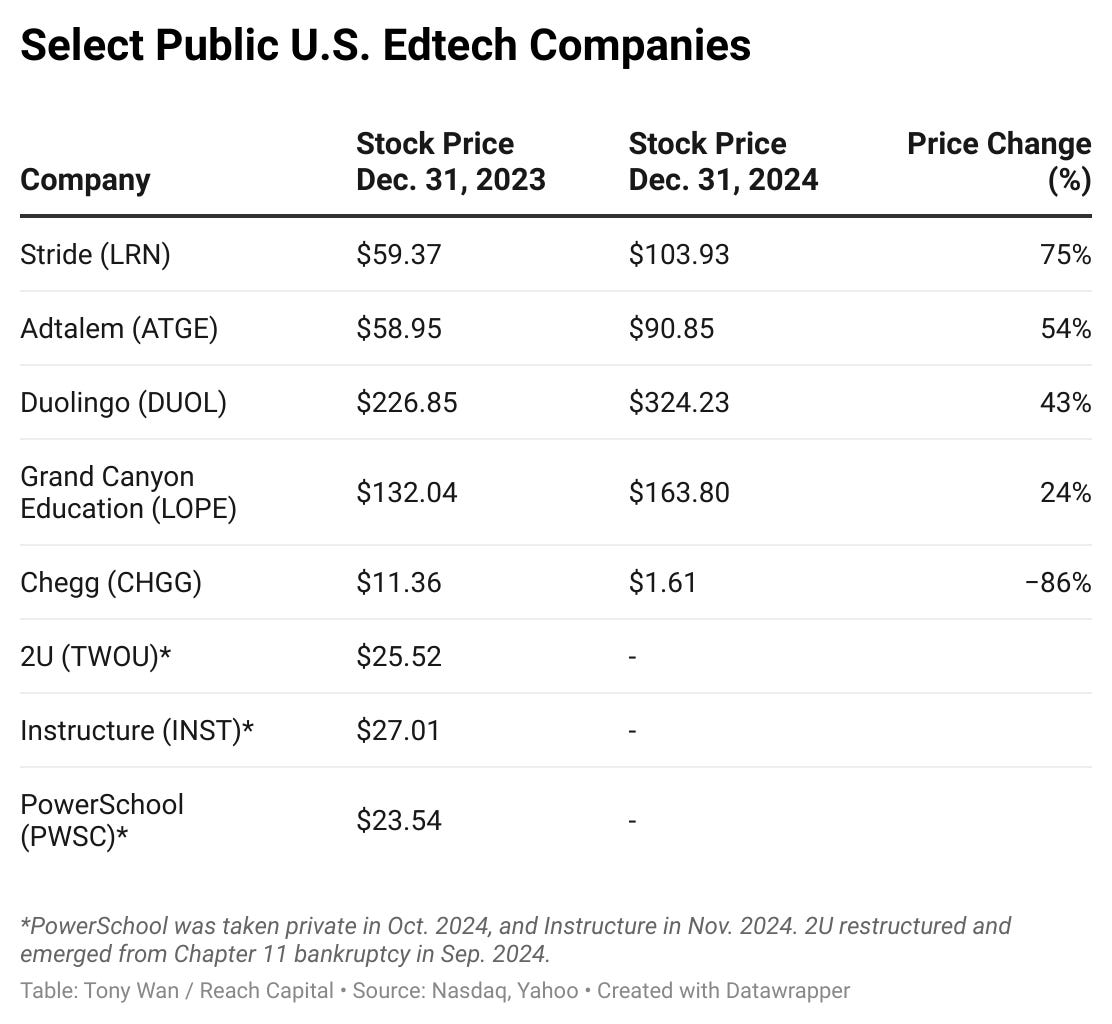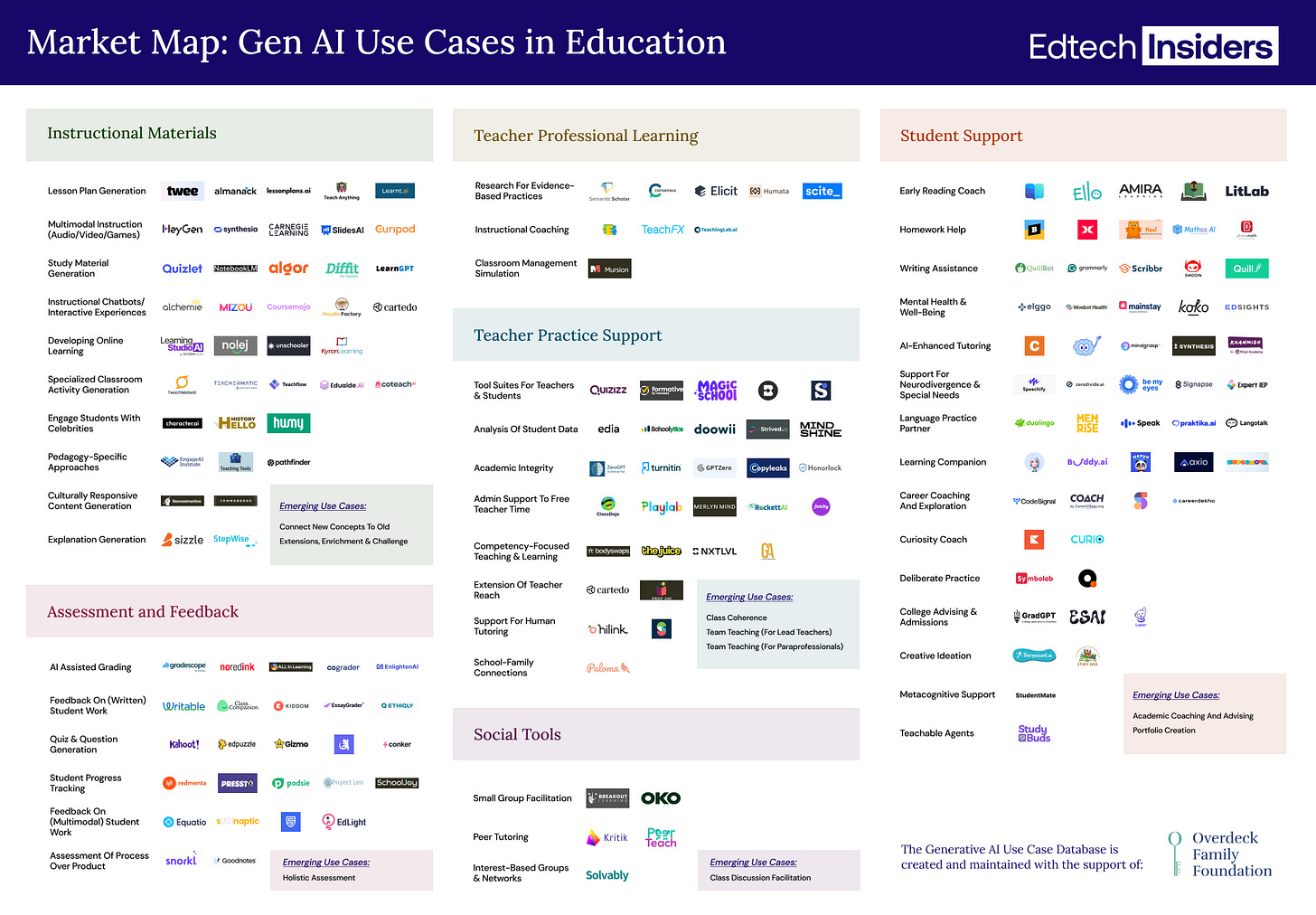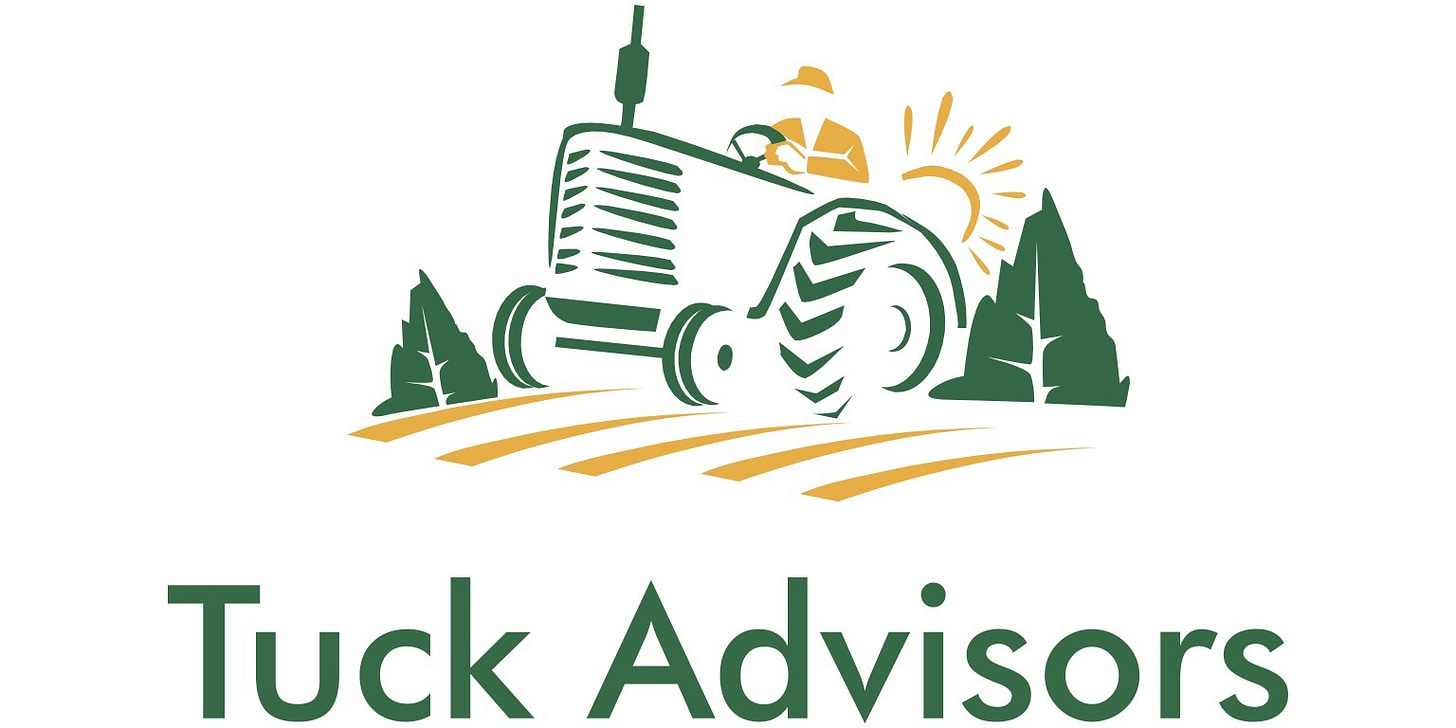Is US Edtech Set for a Rebound in 2025?
2025 CooleyED Bay Area Edtech Summit, Sam Altman on AGI, Arizona's AI taught school, interview with Mark Angel, Co-Founder and CEO of Amira Learning, and more!
Looking for more? Join Edtech Insiders+ for exclusive content and discussion!
Is US Edtech Set for a Rebound in 2025?
By Tony Wan
Tony Wan is the Head of Platform at Reach Capital, and the Co-Founder and former Managing Editor at EdSurge.
Since the dizzying highs of 2021, the edtech sector has faced a stark reality check. The spigot of fast money from low interest rates and federal funds has largely dried up. Funding for startups that have not kept pace with their valuations has dimmed. At the same time, AI has unleashed a wave of company creation — and destruction. Traditional institutions from universities to public schools are reeling, although students, parents, and workers have never had so many opportunities at their disposal.
Amidst these contractions, the U.S. edtech funding environment appears to have stabilized. Even more promising: a new wave of startup creation and investments fueled by AI offers hope that a rebound is on the way.
In 2024, U.S. edtech companies raised $2.9 billion, a modest improvement from 2023. More significantly, it ends two years of decline. This is based on my annual review of 241 deals from Pitchbook, Crunchbase, Matt Tower, and our own internal data, for tools focusing on teaching, learning, and economic opportunity across early childhood, K-12, higher ed, workforce, and lifelong learning.
Even before Generative AI, “edtech” has been expanding beyond its traditional confines of curriculum, instruction, and assessment. Between declining enrollment, staffing shortages and budget shortfalls, and the broadening needs of students and teachers, schools and colleges increasingly rely on external partners to expand their village of support. When I first started reporting on this space 13 years ago as the co-founder and managing editor of EdSurge, mental wellness, food, transportation, and teacher housing hardly registered on the map.
Today, many of these functions are getting much-needed upgrades, buoyed by powerful new technologies. The lines between edtech and adjacent sectors in workforce and health have also increasingly blurred, as training and learning are age- and sector-agnostic endeavors.
The biggest deals of 2024 address a wide range of problems. In higher ed, Anthology provides LMS, SIS and other data systems while Element451 helps improve enrollment, retention, and staffing. Zum is using AI to optimize K-12 transportation. Emergence bridges edtech and deeptech with multi-agent AI tools for knowledge workers. And the newest unicorn Speak is a new language learning tool focused on spoken conversation practice.
Tools for school-aged learners continue to represent well. SchooLinks’ $80 million Series B is a strong signal that college and career readiness programs remain very much in demand in K-12. In special needs, Cortica provides therapy services for autistic and neurodivergent children and Forta ($55 million) provides family-powered autism therapy.
These funding rounds prove there is still investor demand and market opportunity, but they don’t tell the whole story of where edtech is headed and how it must evolve. Since 2021, as capital markets reeled from sharp raises in interest rates and investor skittishness, many companies prioritized profitability and capital efficiency over growth to extend their runway and hold out for better times. Yet slower growth has also meant a lower likelihood of hitting the benchmarks needed to raise follow-on rounds; thus the many extensions, flat, and down rounds we saw in 2024. For companies that raised at the peak of the market, it’s been a challenging year.
Although late-stage and mega rounds exceeding eight figures remain down, this year saw a sizable bump in the number of seed deals. Continued advancements in AI models and agents is driving a surge of new tools. There has also been a blurring of edtech and deep-tech platforms like Harmonic, which is building math reasoning tools that may surpass human capabilities and shape how we learn and teach math and sciences.
In 2025 it’s reasonable to expect even more action at the seed stage, because AI has made it so much easier to build and scale quality software at a fraction of the cost of past products. The first prototype of MagicSchool, perhaps the fastest growing edtech tool in K-12, was built on Replit. (Disclosure: both are Reach portfolio companies.) Expect others to follow, from seasoned founders, educators, and students alike.
Moreover, at the Seed and Series A stages, average deal sizes and valuations have actually increased since the heyday of 2021, with AI-native startups further driving up the numbers. (But please, don’t slap AI in your deck unless you really mean it.)
The mean Seed deal in 2024 was almost $4 million — and beyond for AI startups. These numbers were pushed by outliers like Buddy.ai, an AI English learning platform which raised $9 million, and Outsmart Education, the college alternative led by former Duolingo executives that raised $14 million. The average Series A deal shot past $15 million, though this is skewed by Harmonic’s $75 million raise.
The use cases for edtech have never been more diffuse. (Just check out Edtech Insiders’ Generative AI market map.) The deluge of new tools may feel bewildering to parents, educators, and funders trying to sort out what’s best, but for the industry overall, this is a good problem to have. What is undeniable is the human desire to find and build ways to improve how we teach, learn and live.
Edtech Everywhere All at Once
In the public markets, 2024 was a mixed bag. In higher ed, two former darlings have cratered: 2U filed for bankruptcy, and Chegg’s market cap plummeted as it lost users to ChatGPT and other AI study aids. But older names like Adtalem and Grand Canyon Education, which operate vocational-oriented higher-ed programs, grew steadily. It’s a reminder that post-secondary education can be stubbornly durable, even as some of its traditional institutions face dire financial challenges.
A couple of other brand names were taken private — PowerSchool by Bain Capital for $5.6 billion, and Instructure by KKR for $4.8 billion — and are poised for change as the new owners have announced an aggressive approach to expanding their platforms.
Those that have embraced the shifting winds have seen explosive growth. The biggest name is Duolingo, whose stock gains doubled the S&P 500’s this year. The company continues to invest heavily in AI to generate data for its lessons and real-time conversation practice as it also expands into new areas in music and math.
Also performing well, though largely under the radar, is Stride, the virtual schooling provider formerly known as K12. Driven by record enrollments for its general ed and career learning programs, its stock price recently reached a record high. In recent years, the company has expanded its portfolio of programs and technology partners in response to the changing needs of learners.
“Markets and situations move quickly and can change or pivot on a dime,” Stride CEO James Rhyu recently said in an interview. “The pandemic did more to sell school choice in America than any other force or factor in history, and we positioned ourselves accordingly to serve more families desiring different learning modalities for their kids.”
The evolving K-12 market will necessitate new business models as the “forking” of public education dollars continues. Seventeen states serving 22 million students now have education savings accounts (ESA) programs in place, potentially creating a rich market for direct-to-consumer products. Companies selling to schools may do well to add a consumer orientation, as parents have more say in directing where funds go.
In districts facing steep budget cuts, school leaders are starting to pilot outcomes-based contracts, in which the total value of the contract is based on meeting pre-set outcomes. These are tricky to implement, especially given Laurence Holt’s finding that just 5 percent of students in edtech research studies used the tools at the minimum level prescribed. But should these scale, it will be consequential.
For adults, edtech has become incredibly diverse, featuring verticalized learning solutions for different professions and hobbies. Labor-strained industries have their own specialized training programs, such as Stepful for health care (a Reach portfolio company) and RockEd for the automotive industry. AI copilots are emerging to assist workers with workflows, training and research unique to every sector.
Edtech is also global. It’s beyond the scope of this analysis, but it’s worth mentioning that the mega rounds also went to India-based PhysicsWallah ($210M Series B at $2.8B valuation) and Eruditus ($150M Series F). U.S.-based companies are seeing a greater percentage of their usage from abroad — and vice versa.
In the Chinese Zodiac, 2025 marks the Year of the Snake, symbolized by the shedding of the skin as part of transformation and growth. Between a new administration, advancing technologies, challenges to traditional institutions, and new market opportunities, much change is afoot. Just as cloud technology unleashed new creation and distribution powers, and with it new categories of learning tools, so too will AI. My wish for the year is that we continue to expand our definition of what constitutes “edtech.”
Join Edtech Insiders+
If you love Edtech Insiders and want to continue to support our work, consider becoming a paid subscriber! By joining Edtech Insiders+ you receive:
Early access to all Edtech Insiders events. No more sprinting to sign up for our monthly happy hours, edtech summits, and online conferences.
Access to our exclusive WhatsApp channel to connect with the Edtech Insiders community and discuss the latest trends and news in our space.
Access to exclusive member content, including interviews, panels, videos and articles.
All proceeds from subscriptions will help us invest in our podcast, newsletter, events, and community. Our goal is to make Edtech Insiders an enduring and sustainable community offering that connects the edtech ecosystem!
We would be so excited if you decide to join us as a member of Edtech Insiders+.
The Edtech Insiders Generative AI Map
In case you missed it, take some time to wander around the Beta release of our Generative AI Map! Built in partnership with Laurence Holt and Jacob Klein, the updated map has expanded from previous versions, now consisting of:
The Market Map: An at-a-glance snapshot of the 6 categories and 50+ use cases for AI in education, alongside leading tools that support each use case (and some emerging or potential use cases with few to no supporting tools yet)
The Generative AI Use Case Database: A repository and deep dive into the 50+ use cases for AI in education, including examples, details and supporting tools
The AI Tool Company Directory: A repository and deep dive into over 300 AI companies and tools in education, including each Gen AI company’s website, Linkedin page, company founders, target audience, sector (K12, HE, etc.), platform (web, app) and traction (web traffic and app downloads).
In this Beta phase, we are actively looking for feedback from our community. Take a look, and submit your suggestions through the feedback forms on the site!
To get started, you can read more about how we built and designed the map here, or jump right in to the micro-site here!
Edtech Insiders Upcoming Events
2025 CooleyED Bay Area Edtech Summit
Join edtech-dedicated entrepreneurs, investors and thought leaders at the 2025 CooleyED Bay Area Edtech Summit on Wednesday, February 12 in San Francisco!
Held in partnership with Edtech Insiders, the EdTech MBA Community and Owl Ventures, the Edtech Summit will provide attendees an opportunity to hear from education leaders and top edtech innovators, connect with thought partners and leaders, and listen to and engage in thought-provoking discourse. The afternoon will include a fireside chat and panel discussion on cutting-edge issues in edtech. Participants are invited to join small-group dinners after a networking happy hour.
Want to join? All Edtech Insiders+ members are automatically added to the invite list! If you’re already a member, check your email or the Edtech Insiders + group chat.
This edition of the Edtech Insiders Newsletter is sponsored by Tuck Advisors.
Since 2017, Tuck Advisors has been a trusted name in Education M&A. Run by serial entrepreneurs with over 25 years of experience in founding, investing in, and selling companies, we believe you deserve M&A advisors who work as hard as you do. Please enjoy access to The M&A Matrix by Tuck Advisors™ on ChatGPT—tailored to support founders and CEOs like you in navigating the M&A world.
Have questions, or are you ready to explore the next steps? Reach out to us.
Top Edtech Headlines
1. AI x Education 2024 Year in Review
The "AI x Education 2024 Year in Review" provides a comprehensive overview of how artificial intelligence has influenced education throughout the year. It discusses advancements in AI-driven personalized learning, administrative automation, and intelligent tutoring systems, while also addressing challenges such as ethical considerations and the need for educators to adapt to rapidly evolving technologies. The review offers insights into the transformative potential of AI in reshaping educational paradigms and highlights emerging trends that may shape the future of learning.
2. OpenAI’s Sam Altman Says ‘We Know How to Build AGI’
In a recent blog post, OpenAI CEO Sam Altman announced that the company is confident in its ability to develop artificial general intelligence (AGI) and anticipates that AI agents capable of autonomously performing tasks will begin to significantly impact company outputs this year. Altman also reflected on his temporary departure and subsequent return to OpenAI in 2023, emphasizing the organization's commitment to ensuring that AGI benefits all of humanity.
3. AI Agents Will Shape Every Aspect Of Education In 2025
In his Forbes article, Ray Ravaglia discusses the transformative impact AI agents are expected to have on education in 2025. He highlights how AI will enhance personalized learning, automate administrative tasks, and provide intelligent tutoring systems, thereby reshaping traditional educational models. Ravaglia also addresses potential challenges, including ethical considerations and the need for educators to adapt to rapidly evolving technologies.
4. AI Is a Game Changer for Students With Disabilities
Artificial intelligence is revolutionizing education for students with disabilities, offering tools that assist with tasks like reading and writing. For instance, 14-year-old Makenzie Gilkison, who has dyslexia, utilizes AI-powered chatbots and word prediction programs to keep up with her peers, leading to her induction into the National Junior Honor Society. Schools are increasingly adopting AI technologies to support students with various impairments, including visual, speech, language, and hearing difficulties. However, educators are striving to balance the benefits of AI with the need to ensure that students continue to develop essential skills independently.
5. Arizona’s Getting an Online Charter School Taught Entirely by AI
Arizona has approved Unbound Academy, an online-only charter school where AI will deliver the entire academic curriculum. Students in grades four through eight will engage with AI-driven platforms that adapt to their individual learning styles, with human "skilled guides" available for support. The program condenses academic instruction into a two-hour window, dedicating the rest of the day to life-skills workshops covering topics like critical thinking and financial literacy.
Cooley LLP is the go-to law firm for edtech innovators, from early childhood through workforce. Informed by decades of experience in the education vertical, Cooley created the first edtech practice to provide industry-informed, business-minded counsel to companies and organizations at all stages of the corporate lifecycle. Cooley provides a multidisciplinary approach to client needs, offering seamless collaboration across offices and practices.
To learn more about what Cooley can do for you, reach out to Naomi May.
Interview: Mark Angel, Co-Founder and CEO of Amira Learning
We have had some amazing guests on The Edtech Insiders Podcast in the last few weeks. One of our stand-out interviews from this past week is with Mark Angel , the CEO and Co-Founder of Amira Learning!
Here’s a deep dive on our interview with Mark, and we encourage you to give the full episode a listen for more!
The Role of Rigorous Research in Edtech
Mark Angel emphasizes the necessity of subjecting educational technology to rigorous trials and independent research before deploying it in classrooms. He draws parallels with the medical field, advocating for a similar respect for the end user, particularly young learners.
"I don’t think any of us have a right to plunk technology into a classroom unless we’ve put it through the paces of rigorous random control trials and independent research." - Mark Angel
Amira as an AI-Powered Listening Engine
Amira's core functionality lies in its ability to listen to students’ oral reading and diagnose issues such as dyslexia, reading fluency, and comprehension challenges. This capability is rooted in decades of research from Carnegie Mellon University.
"The secret to helping kids become motivated, masterful readers is to listen to them and understand what their brain is going through as they learn to read."
- Mark Angel
Scaling Through Partnerships
Amira’s growth strategy involves partnerships with content providers and major education companies, allowing it to focus on AI development while leveraging others' expertise in curriculum design. Collaborations with entities like Houghton Mifflin Harcourt and Pearson demonstrate this approach.
"We designed Amira to use the work of great people in the education sector while sticking to what we knew others couldn’t do: build an AI-powered coach."
- Mark Angel
AI as a Catalyst for Solving the Learning Crisis
Mark Angel expresses confidence in AI's potential to transform education, akin to how medical advancements have extended human lifespans. He envisions a future where AI accelerates reading outcomes and bridges educational gaps.
"I promise you that 20 years from now, we will see the fork in the road that came with AI and the acceleration in reading scores and outcomes we’ve waited decades for." - Mark Angel
Curious to Learn More?
You can listen to our full interview with Mark, as well as interviews with many other edtech founders, investors, and thought leaders at The Edtech Insiders Podcast! Check it out, and as always, we’d love to hear what you think!

















